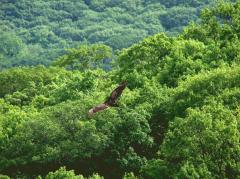Oh-Yo
 Although the chances are not so frequent, if you look up at the sky of Metropolitan Tokyo, you can still see black kites (as in “small hawks with long, narrow wings”) flying. Biologically, hawks and eagles are both classified as raptors in the order of Falconiformes. They can fly freely in the sky mostly because they have no natural enemies and only humans can tame such raptors. In ancient Japan, hawk-hunting was already being performed during the ancient Kofun Period, and in modern history it was enjoyed as a form of recreation by the samurai warrior class.
Although the chances are not so frequent, if you look up at the sky of Metropolitan Tokyo, you can still see black kites (as in “small hawks with long, narrow wings”) flying. Biologically, hawks and eagles are both classified as raptors in the order of Falconiformes. They can fly freely in the sky mostly because they have no natural enemies and only humans can tame such raptors. In ancient Japan, hawk-hunting was already being performed during the ancient Kofun Period, and in modern history it was enjoyed as a form of recreation by the samurai warrior class.
In Japan, there is a saying “Ichi-fuji, Ni-taka, San-nasubi”, which literally translates to “The First is Mt Fuji, the Second is hawks, and the Third is eggplants”. If one were to dream of such things during one’s first night of sleep in the New Year, it was said to bring one happiness all throughout that year. According to experts, these are items that were special to Suruga, the old province with which the Shogun Ieyasu Tokugawa is strongly associated. The “hawks’ in “Ni-taka” is said to have originally alluded to Mt Ashitaka, but all the same it is true that Ieyasu loved hawk-hunting and kept a lot of hawks in Suruga. In addition, hawks were well-accepted by commoners as birds which brought good fortune, not only because they were strong and clever, but also they “tightly grasped” their prey with their sharp claws.
There is a Japanese word “Oh-Yo”, for which one of the Chinese characters (kanji) is the one meaning “hawk”. According to the 6th Edition of the prevalently-used Kojien Japanese dictionary, there are two meanings for this word. The first is to “behave calmly without any fear”, just like a hawk flying freely in the sky. The second means “to be in state of being completely composed in a relaxed manner”. The word originally came from China and appears in “Shikyo”, the oldest collection of poems in China.
Before this word was imported from China, there already existed in Japan a word with the same pronunciation, but written using a different Chinese character (kanji) that denoted the meaning “big” or “grand”. In the classic “Heike Monogatari” (or “Tales of the Heike”), there is an expression which uses the older version of this word as in “Lord Shigemori has such a generous (“Oh-yo”) personality”. Originally, the older version of “Oh-yo” referred to the characteristic of a person being very generous and unconcerned about the little things in life. Its less flattering meaning referred to a “rough personality trait”. Because the two versions of “Oh-yo” shared similar meanings, they gradually came to be united into a single term that uses the Chinese character (kanji) for hawk.
Besides the word “Oh-yo” using the Chinese character (kanji) for hawk, the long historical relationship of the Japanese people with hawks makes it very easy to imagine how natural it is for people to use the image of hawks flying freely in the sky to express the notion of generosity.
A landscape with hawks and black kites flying about in a mountain village is a typical Japanese scenery of the heart. Modern people living in this highly-civilized world may feel a kind of admiration for the birds calmly circling in the sky.
It is not easy for us to “behave generously” (“Oh-yo ni kamaeru”) while living in this complicated, modern society. We tend to be swayed by satisfying immediate self-interest and gaining the honor of others, while being intolerant of the ideas and actions of those around us. However, on this earth where hundreds of living species exist together, it is incumbent upon us to have a tolerant attitude of mutual respect for each other’s existence and to admire the workings of nature as it is.
Is it such an over-exaggeration to say that the word “Oh-yo” contains the emotional state of human beings who must co-exist with nature? How can human beings remain steadfastly “generous”? Perhaps it is case that the hawks and kites are just watching how we humans are doing from way up in the sky.
(Kenji Suzuki)










